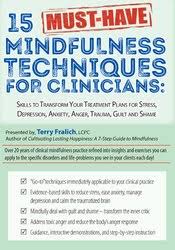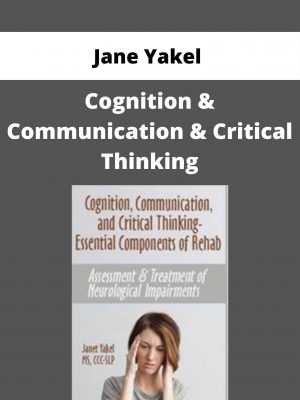Terry Fralich – 15 Must-Have Mindfulness Techniques for Clinicians, Skills to Transform Your Treatment
$200 Original price was: $200.$75Current price is: $75.
Shopping Instructions:
- DISCOUNT 15% : SHOP15
- Product Delivery: Within 1 – 12 hours after purchase.
Terry Fralich has studied extensively with His Holiness the Dalai Lama and with some of the American pioneers in the mindfulness field.
Terry Fralich – 15 Must-Have Mindfulness Techniques for Clinicians, Skills to Transform Your Treatment
From depression and anxiety to stress and trauma, mindfulness has demonstrated its ability to help reduce suffering. With all its benefits, mindfulness is now widely used in clinical practice. There are literally hundreds of mindfulness interventions available to clinicians. But with so many to choose from, how do you know which to use? How do you decide on your “go-to” techniques?
Terry Fralich has studied extensively with His Holiness the Dalai Lama and with some of the American pioneers in the mindfulness field. With more than 20 years teaching mindfulness and using mindfulness techniques in his clinical practice, Terry has distilled the sea of available techniques into the essential hands-on mindfulness skills and exercises you need to treat your clients.
Watch Terry, and learn to effectively use 15 mindfulness practices you can incorporate into your treatment plans for depression, anxiety, stress, and trauma. Terry will guide you through the specific exercises that he’s found most capable in shifting clients away from stress responses, intervening in the downward spiral of depression and anxiety, and cultivating safety and groundedness in traumatized clients. In addition, he’ll give you detailed instruction on his top mindfulness interventions to help your clients properly deal with guilt and shame and empower them to manage their anger and toxic emotions.
As an additional benefit, you’ll have the opportunity to practice the application of what you’ve learned.
Enhance your clinical practice with mindfulness skills that work!
- Motivate clients to engage in treatment with understandable descriptions of the neurological processes that underlie common disorders and easy to follow explanations of how mindfulness can affect these processes.
- Establish how mindfulness practices can be used in therapy to impact the stress reaction and shift clients to a relaxation response.
- Incorporate mindfulness interventions into your treatment plans for depression and anxiety that can counter automatic patterns of thoughts.
- Communicate how mindfulness and breathing techniques that reduce the body’s anger responses can be taught in-session to help clients manage their angered outbursts.
- Analyze the neurobiology of the traumatized brain and calm it with grounding techniques and breathing exercises.
- Appraise the clinical utility of mindfulness-based therapies in regulating shame and guilt.
Would you like to receive Terry Fralich – 15 Must-Have Mindfulness Techniques for Clinicians, Skills to Transform Your Treatment ?
Reduce Stress with Mindful Coping Skills
- Educate the client about the impact of stress
- Practice makes perfect – transform the stress response
- Exercises
- Strengthen awareness of the stress response
- Shifting to relaxation response: cultivate a foundation of groundedness, settledness, and ease
- Mindful transitions
Manage Depression and Anxiety with Mindfulness Techniques That Work
- The downward spiral and the brain’s default mode
- Cultivate motivation and action
- Witness the anxious mind
- Get unstuck from anxious rumination
- Exercise:
- Self-regulation practices for anxiety
Mindfulness as the Antidote to Anger
- Understand the sources of anger
- The body’s anger response
- Identify early signs of the anger forest fire
- Clarify the practice: What am I trying to remember?
- Exercise:
- Rehearsal of the Stop-Breathe-Reflect-Choose practice
Calm the Traumatized Brain
- Proceed with caution – avoid retriggering and retraumatizing
- Retrain the dysregulated nervous system
- Cultivate safety
- Exercises:
- Grounding techniques
- Breathing techniques
- Positive visualization
Transform the Inner Critic: Mindfully Deal with Guilt and Shame
- Identifying primary core negative belief
- Cultivating a healthy and true vision of self
- Exercises:
- The protective quality of mantras
- Exercises that promote self-forgivenes
Related products
NLP & Hypnosis
NLP & Hypnosis
NLP & Hypnosis
NLP & Hypnosis
NLP & Hypnosis
NLP & Hypnosis
NLP & Hypnosis












